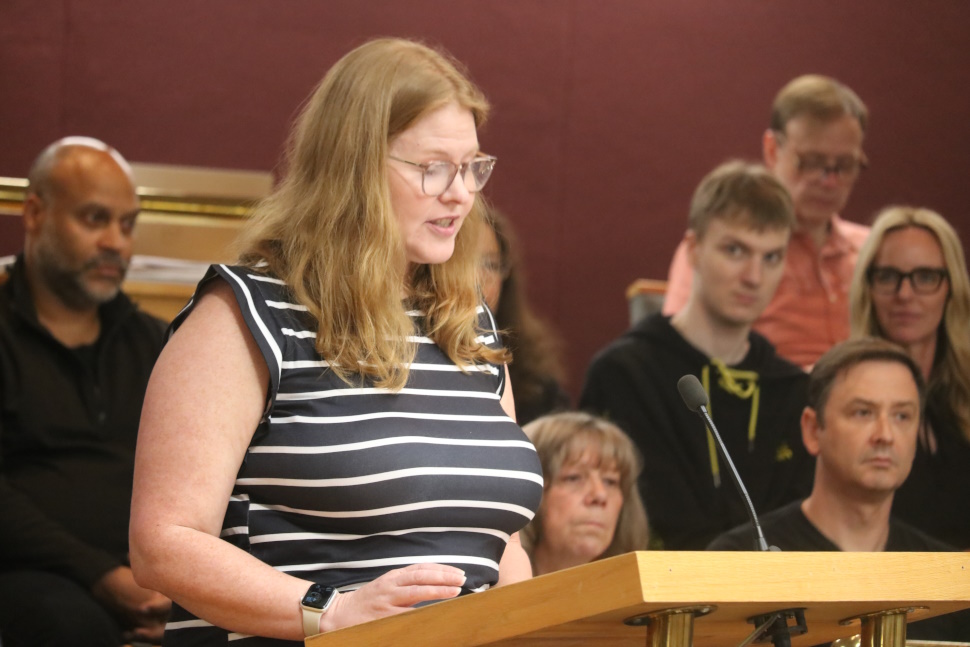Concerns have been raised about a family support addiction treatment centre that received approval to operate out of the former Chez Nous care home.
City administration received a development and building permit application on May 22 for 1101 Grafton Ave., which is within the R3 – High Density Residential District.
The application proposed converting the 50 single-room suites into 23 multi-room suites: 16 three-bedroom units, five two-bedroom units and two treatment/support suites, operated by Ranch Ehrlo.
The application met the criteria for supportive housing under the current zoning bylaw, which is a permitted use in R3, so no public notice or discretionary discussion with city council was required.
Kirsten Downey, a concerned resident, addressed city council Monday night, saying residents received mixed messages. She noted that while Ranch Ehrlo will operate the facility, the property was purchased by a for-profit company, Trinity Real Estate of British Columbia.
Downey said residents first heard the site would be a family support addiction treatment centre. After questions arose, Ranch Ehrlo distributed flyers to some neighbours, which created more confusion.
She said the flyers only described the project as supportive housing, while the city referred to it as a family unification centre. However, the report to council mentioned detox support staff.
Downey also noted that until last week, the Ranch Ehrlo website listed Moose Jaw as the base for its addiction treatment program, but that reference has since been removed. She questioned why the plan lists 23 suites but only 16 will be used at a time.
“That doesn’t make sense to me,” Downey said.
She added that the handout said the program would serve local families, but other material indicated it would serve families nationwide.
“These kinds of inconsistencies create frustration, mistrust and a lack of transparency,” she said, noting requests for public information sessions have gone unanswered.
Downey also raised concerns about traffic, parking, noise, neighbourhood safety and increased demand on public services. She said police, EMS, school divisions and social services were never consulted.
Downey questioned why daycares and medical offices are discretionary uses in R3 zones, but this facility is not.
“If a daycare or medical office requires that level of review, why wouldn’t a facility with capacity to hold 23 families dealing with addiction—providing counselling, detox nurses and early childhood educators—require the same?” Downey said.
She said she reviewed zoning bylaws in several cities, including Regina, Saskatoon, Prince Albert, Calgary, Edmonton and Winnipeg, and found a project of this size would typically be discretionary or not approved at all.
Downey stressed she was not necessarily against the project but wanted more information. She asked council to consider making such projects discretionary, send the application back for public consultation and develop a comprehensive strategy for supportive housing and related services.
Coun. Patrick Boyle agreed there is a gap in the zoning bylaw, saying administration followed current rules but council needs to address the issue.
Boyle also criticized the absence of Trinity Real Estate and Ranch Ehrlo from the meeting.
“This has uncovered an issue that needs to be addressed at this table, and the frustrating thing for me is the lack of information. We are hearing from residents, but not from the company,” Boyle said.
City manager Maryse Carmichael said administration did not invite the property owner or operator because they were unaware of the council meeting after the deadline passed.
Boyle replied, “If you want to operate in a residential neighbourhood in the City of Moose Jaw, I would expect you to take proactive steps to show up at council and talk to residents.”
Mayor James Murdock agreed communication was the biggest issue.
“I think if we can have community involvement, everyone benefits,” Murdock said.
When the zoning bylaw was amended in 2019, it broadened the definition of supportive housing. Coun. Chris Warren asked whether that change affected this case.
Carmichael said the definition did not change significantly enough to alter the outcome—the project would still have been permitted.

Director of community services Derek Blais said administration reviewed bylaws in other municipalities, including the 10 cities Downey referenced. Among Saskatchewan’s five largest cities, 62 per cent of similar projects are permitted uses and 38 per cent discretionary. In Alberta, it’s 47 per cent permitted and 52 per cent discretionary. Manitoba is 40/60, and British Columbia is 16/84.
Blais said a new zoning bylaw is in the works, with hopes to bring it to council by year-end. It will include separate definitions for supportive housing, treatment centres, emergency shelters, personal care homes, rehabilitation centres, special care homes and supervised consumption sites.
Coun. Heather Eby warned council that denying a valid development permit could set a dangerous precedent.
“Is that the message we want to send? If it’s not compliant, that’s one thing. But when it’s following the rules and process, we risk chasing developers away,” Eby said.
Warren said he spoke with Ranch Ehrlo president and CEO Natalie Huber before the meeting and found discrepancies between facts and community feedback.
He moved that administration formally request Ranch Ehrlo hold a public information session and continue researching supportive housing regulations elsewhere, including recommendations for the new zoning bylaw.
Coun. Dawn Luhning cautioned council cannot force Ranch Ehrlo to act, as doing so could trigger legal action. Warren clarified the request would be in good faith and voluntary.
Coun. Carla Delaurier said council was “between a rock and a hard place,” balancing legal risks with community concerns.
At this point, the meeting turned heated.
Boyle asked for an amendment that Ranch Ehrlo be asked to voluntarily pause the project and hold public consultation. There were questions about whether his amendment would change the intent of the motion and would be out of order.
Warren felt it did change the intent of his motion and Luhning, as chair, ruled it was out of order.
A visibly frustrated Boyle defended his amendment saying that pausing the project and asking for public consultation go hand-and-hand.
A vote of Warren’s motions passed unanimously.
However, Boyle asked that “before I get my hand slapped again” if he could put forward a third motion asking Ranch Ehrlo to voluntarily pause the project.
After some discussion, Carmichael asked for a break and then requested that city administration and city council go in-camera to receive legal advice.
After returning from their in-camera session, Boyle rescinded his motion upon legal advice.
